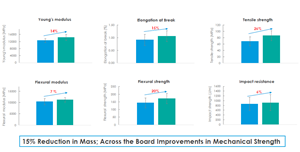Modular equipment achieve continuous, versatile composites processing
CAMX 2024: IPCO highlights its novel precision scattering system designed to process recycled/reclaimed composite materials, as well as the multi-stage ThermoPress double-belt press.
Share
For the first time, IPCO US (Totowa, N.J., U.S.) is presenting a new precision scattering system specifically designed to process recycled materials from wind turbine blades, glass fiber, carbon fiber, various composites production trim waste and many other reclaimed/recycled material streams.
Combined with the company’s ThermoPress double-belt press, the company says its system provides composites manufacturers with a process solution for the design and production of circular thermoplastic and thermoset panel products.
ScatterPro is IPCO’s highly extensive range of scattering machines. Including oscillating and rotating brush-off systems, they are are designed for versatile powder scattering and precision scattering solutions across various materials: powder, granules, fibers, chips, flakes and other flowable bulk materials.
Moreover, its portfolio of double-belt press systems feature a modular design — modular pressure. This approach means that users can combine different types of processes into one continuous production, such as incorporating controlled polymerization, curing, tempering/annealing and cooling. Moreover, the systems’ horizontal process sequence, which eliminates product deflection, avoids material tensions.
IPCO highlights the following for its double-belt presses:
- Flexibility in processing different kind of materials and/or products on the same machinery system;
- Improved control of individual process parameters;
- Efficiency and versatility via its continuous process;
- Consistent quality;
- Enables a high degree of automation;
- Offers a high-capacity system design;
- Features steel belts from IPCO’s in-house production;
- Remote control service is available;
- U.S.-based technical and aftermarket service.
IPCO representatives are available to discuss product specifications and production requirements.
Related Content
-
VIDEO: High-rate composites production for aerospace
Westlake Epoxy’s process on display at CAMX 2024 reduces cycle time from hours to just 15 minutes.
-
Graphene-enhanced SMC boosts molded component properties
CAMX 2023: Commercially sold GrapheneBlack SMC from NanoXplore increases part strength, stiffness and provides other benefits for transportation, renewable energy, energy storage and industrial markets.
-
Winding software developed for filament winding machines
CAMX 2023: Roth Composite Machinery focuses on automation, safety and time savings.
Related Content
VIDEO: High-rate composites production for aerospace
Westlake Epoxy’s process on display at CAMX 2024 reduces cycle time from hours to just 15 minutes.
Read MoreGraphene-enhanced SMC boosts molded component properties
CAMX 2023: Commercially sold GrapheneBlack SMC from NanoXplore increases part strength, stiffness and provides other benefits for transportation, renewable energy, energy storage and industrial markets.
Read MoreWinding software developed for filament winding machines
CAMX 2023: Roth Composite Machinery focuses on automation, safety and time savings.
Read MoreEpoxy curing agents designed for composite applications
CAMX 2023: Dixie Chemical specializes in anhydride-based epoxy curing agents, including NMA.
Read MoreRead Next
Techmer PM inducted as Purdue CAM’s first material supplier
Techmer PM, Purdue to create materials optimized for LFAM at Composites Manufacturing and Simulation Center, while providing education, validated simulation tools, materials characterization and industry best practices.
Read MorePlant tour: Aernnova Composites, Toledo and Illescas, Spain
RTM and ATL/AFP high-rate production sites feature this composites and engineering leader’s continued push for excellence and innovation for future airframes.
Read More“Structured air” TPS safeguards composite structures
Powered by an 85% air/15% pure polyimide aerogel, Blueshift’s novel material system protects structures during transient thermal events from -200°C to beyond 2400°C for rockets, battery boxes and more.
Read More











